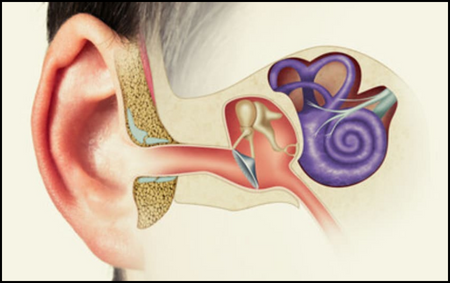Vestibular Hypofunction – Symptoms, Causes, and Treatment
Abstract
“Vestibular Hypofunction” as the name says its own meaning, it can be determined as hypo that is inadequate functioning of the inner ear. The inner ear performs a lot of functions like balancing the equilibrium of the body and to transfer the sound waves to the auditory nerves of the brain. The disease vestibular hypofunction is correlated to Bharama in Ayurveda. This disease according to Acharya is caused due to imbalance of vata and pitta dosha and also alteration of mansik dosha Raj, that imbalances the tam guna of a person and hence the person hallucinates.

Introduction
Vestibular hypofunction is considered to be a condition in which the internal ear dysfunctions due to disequilibrium. So when it dysfunctions it makes the person experience dizziness, lack of concentration, inability to balance and many others. There are certain reasons that cause vestibular hypofunction like nutritional deficiency, poor circulation in ear or even trauma can be a reason. Vestibular hypofunction can be bilateral or unilateral. Bilateral hypofunction results in the inability of the person to walk in uneven surfaces or in a dark room. This happens due to inadequate work done by the peripheral vestibular system. And unilateral vestibular hypofunction is due to pathology in one ear and proper functioning of another ear that results in symptoms like dizziness, vertigo, anxiety and many others as listed further.
Causes Of Vestibular Hypofunction
The actual cause of vestibular hypofunction is not known yet hence this disease is considered to be an idiopathic disease.
- Some neurodegenerative conditions like polyneuropathy, Ataxia, superficial siderosis etc.
- Congenital conditions such as Turner Syndrome, enlarged vestibular aqueduct can also be a cause.
- Recurrent attacks of infection like Herpes simplex virus, encephalitis, can be a reason too.
- Vestibular hypofunction can result from trauma like that in head injury which causes brain injuries too.
- Ear infections like meniere’s disease, labyrinthitis can also be a reason for it.
- As a side effect of previously consumed medicines
Signs And Symptons
- Imbalance felt by patient
- Visual vertigo
- Nausea & vomiting
- Dizziness
- Cognitive defects
- Inability to maintain posture
- Psychological symptoms
- Tinnitus
High Risk Factors
High risk factors include –
- Meningitis
- Vestibular neuritis
- Neurofibromatosis
Diagnosis
- Audiometry
- Caloric test
- Cerebral imaging
- Head impulse test
- Torsion swing test
- Video head impulse test (VHIT)
- Dynamic visual acuity test (DVA)
- Tuning fork test (air conduction and bone conduction)
- Blood tests
Treatment
- Treatment of the underlying cause should be done, like ear infection should be subsided.
- Vestibular rehabilitation or balance retraining therapy can be done
- Physiotherapy can be done for balance and gait training.
- Few changes in lifestyle may also help- like exercise and yoga for a while, walking for a while.
- Surgery
Complications
Complications of vestibular hypofunction may include injury by falling that’s caused by improper balance management.
Ayuervedic Aspects Of Vestibular Hypofunction – Bhram
In Ayurveda this disease can be correlated to bhram. Bhram is categorised among Manasa rogas (psychological disorders). The sharirik and mansik dosha responsible for bhrama are Vata and Pitta dosha and raja guna. Ayurveda says that due to depletion of tama guna one loses his/her state of consciousness and faints. The alteration of doshas both mansik and sharik forms sensation in the head. Also the person experiences dizziness.
Chikita / Treatment Of Bhram
Treatment of brahma includes –
- Shodhana chikitsa (that includes virechana, basti karma and samsarjana karma)
- Shamana chikitsa includes the intake of rasayana aushadhi with milk and mishri.
- Ghrit paan or consumption of cow ghee can be done
- Shiro basti or oil pulling can be done
- Karna purana (filling of oil into the ear)
- Lepa (medicated paste can be applied in forehead)
- Shiro abhyanga (head massage by medicated oil can be done)
- Exercises that can stabilise gaze
- Few yogas that include Dhanurasana and halasana
Herbal Remedies For Vestibular Hypofunction / Bhram By Planet Ayurveda
Planet Ayurveda which is a GMP – certified US FDA-registered company. They manufacture herbal medicines out of natural herbs that are devoid of any adulteration. All the medicines they produce are environment friendly and are 100% vegetarian. All the herbal medications are prepared under guidance and supervision of experts of ayurveda. Along with herbal medicines they also provide a personal diet routine to treat each patient well. The capsules by Planet Ayurveda are made from plant cellulose thus making it completely herbal. Their customers are growing globally. Planet ayurveda has also manufactured herbal medications for brahma or vestibular hypofunction. Listed below are the medication for it-
- Boswellia Curcumin
- Guggul cap
- Neurogenie cap
- Indian Valeriana
- Memory Support


1. Boswellia Curcumin
Boswellia curcumin capsules by planet ayurveda that contains extraction of Curcumin (Curcuma longa) and Shallaki (boswellia serrata) both works as pacifier to vata dosha as the disease vestibular hypofunction is mainly due to vitiation of vata dosha this formulation plays an important role. Boswellia curcumin also works as an analgesic hence provides relief from pain and inflammation.
Dosage – 1 capsule twice daily, with plain water after meals.
2. Guggul capsules
These capsules by Planet Ayurveda are made up of 100% natural toxin free products. It is made up of the extraction of a single drug Guggul (Commiphora mukul). This single drug removes toxins from the ear and cleanses the channels of the ear that ultimately helps in better circulation to the ear and also reduces pain and swelling.
Dosage – 1-2 Capsules twice daily after meals with plain water.
3. Neurogene Capsule
These capsules by Planet Ayurveda effectively act as nervine tonic, it does so by nourishing nerves and improving muscular strength of muscles of the ear. Also the contents of these capsules Brahmi (Bacopa Monneri) and Ashwagandha (Withania Somnifera) act as Vata Dosha pacifiers. Hence all these properties help to reduce symptoms of Vata Dosha in the ear.
Dosage – 1-2 Capsules twice daily, with plain water after meals.
4. Indian Valeriana
Indian Valeriana Capsule being an extraction of single drug Tagar (Valeriana Wallichi) relaxes the tensed nerve and pacifies Vata dosha in the body that helps improve hearing. It also relieves stress of the muscles of the inner ear thus improves hearing loss. This wonderful herb also tackles disturbed sleep and works as a natural mood elevator.
Dosage – 1-2 capsules twice daily with plain water, after meals.
5. Memory Support
Memory Support Capsules by Planet Ayurveda increases memory and relieves mental stress. It contains herbs that act as natural memory enhancers like Brahmi (Bacopa monnieri), Vacha (Acorus calamus), Shankhpushpi (Convolvulus pluricaulis) and many others. These herbs repair the damaged cells and improve hearing without any side effects. It is also helpful in anxiety caused by vertigo or tinnitus, or the bhram (Hallucinations) caused.
Dosage – 1-2 Capsules twice daily, after meals with plain water.
Conclusion
Vestibular Hypofunction or Bhram as said in Ayurvedic classics is a state where the person feels imbalanced, vertigo, dizziness and a lot more due to dysfunction of the inner ear. As said in Ayurveda classics Bhram is due to vitiation of two doshas that are Vata dosha & Pitta dosha and rajo guna that leads to improper functioning. Vestibular hypofunction can be unilateral or bilateral. Ayurveda considered this disorder among mansik rogas that is psychotic disorders and has given vast herbal remedies to it. Planet Ayurveda thus by following all the Ayurvedic texts has formulated these above mentioned remedies.
Dr. Vikram Chauhan
Latest posts by Dr. Vikram Chauhan (see all)
- Best Herbs That Kill Cancer Cells - December 12, 2023
- How to treat optic neuritis in ayurveda with herbal remedies - December 11, 2023
- Treatment of Sarcoidosis in Ayurveda with Herbal Remedies - November 20, 2023
- Vibhitaki/Baheda (Terminalia bellirica)- Benefits, Medicinal Uses, Dosage & More - November 18, 2023
- Chylous Ascites Causes Symptoms and Treatment in Ayurveda - October 4, 2023




